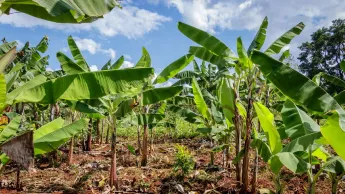Community Challenge - Ideas for sustainable agriculture
More and more land is being used and intensively farmed for agriculture to . Monoculture farming and the use of pesticides are however significant causes of a decline in . Innovative ideas relating to agricultural methods that ensure food supply for humanity, without endangering biological diversity, are therefore urgently needed. The Alumniportal Deutschland ‘Community Challenge’ that ran between March and July enabled Germany’s alumni to present ideas for sustainable agriculture, receive feedback and network with one another.
Eight proposals were selected from the numerous entries; the finalists presented these on 8 July 2022 at a virtual pitch event. The three ideas which received the most votes from the community and jury are now to be further developed as sustainable and social business models. This includes the winners receiving intensive coaching from the global development management consulting firm , among other things in relation to drawing up a business plan, financial aspects, marketing strategies and funding opportunities. ‘Working with entrepreneurs in a research context is particularly exciting, because they adopt innovative approaches’, says Benjamin Klein from Social Impact. Albeit they come from a rather perfectionist background that has little to do with start-up rationale: ‘We try to convey that it’s sometimes important to just get started and proceed into the testing phase at an early stage to obtain feedback.’
Improvement in water supply for agriculture
Plant entomologist Dr Elyeza Bakaze, one of the three winners, is primarily seeking cooperation partners and financial support to be able to implement his idea. He is conducting research into technologies that can mitigate the – by which East Africa is severely affected: Most of these technologies are focused on annual crops, although perennial crops such as coffee and bananas are just as important as a source of food and income.’ He wants to create so-called ‘water soil conservations basins’ (WaSCoB) on around 200 selected coffee and banana plantations in two districts in Uganda's 'cattle corridor’. They suffer severely from the alternation of and . These conservation basins collect water and then slowly drain it underground through perforated pipes. WaSCoB not only increase soil moisture, they also counteract erosion because sediments can settle. ‘They simultaneously serve as decomposition pits, which increases soil fertility and benefits biodiversity’, Bakaze explains. He has already verified in a similar research project that banana plants thrived much better after the creation of such pits: ‘The Challenge gave me the impetus to reconsider WaSCoB as an even better solution.’
Greater sustainability in food production
Solar energy expert Ronnie Ssejjuko, also from Uganda, came up with his winning idea during the 2020 lockdown – due to an acquaintance who kept his head above water by selling home-grown mushrooms. These nutritious and inexpensive mushrooms are increasingly seen as a meat substitute in Uganda. Yet their production requires a lot of water and generates heaps of unused mushroom waste, so Ssejjuko reflected on potential improvements. ‘I love Innovation!’, he states. His novel mushroom cultivation unit uses all resources within the production cycle and is also suitable for water-scarce regions, since the waste water is collected and transported via a solar-powered pump to an overhead tank for reuse. Pyrolysis is used to form the mushroom waste into briquettes and the resulting waste heat is used to produce durable dry products from the mushrooms. In addition to this holistic approach, it was primarily the simple feasibility of the project that persuaded the jury and community. ‘This competition was a superb opportunity to make people enthusiastic about my idea’, says Ssejjuko. ‘The next steps are now to build and test a prototype, produce a video and obtain financial assistance to enable production on a larger scale.’ The intention is to ensure that smallholders in Uganda will be able to acquire the mushroom cultivation units on a hire-purchase basis.
Improved planning of maize cultivation
‘It was brilliant being able to learn about so many exciting ideas and to meet other alumni!’, Oshin Sharma reports regarding the Community Challenge. ‘I also learned a lot about presenting your ideas – having to concentrate on the most important points, for example.’ Her proposal for providing reliable weather forecasts via SMS and messenger services to maize growers in the village of Maduwa in the central hills of Nepal took the agronomist into the final of the competition. The topography and dry season make it almost impossible to provide regular irrigation, so maize growing in the region is mainly dependent on there being rain a few weeks after sowing. Yet climate change has resulted in such precipitation becoming less frequent. ‘Their entire investment is lost if doesn’t rain’, says Sharma, who has been visiting her grandparents in Maduwa regularly since childhood and is therefore well aware of the problems. She had already won over the farmers in the village to her concept. ‘I’m now in touch with local government officials – and recently had the opportunity to present my idea to an NGO. I really hope that I can realise it!’

